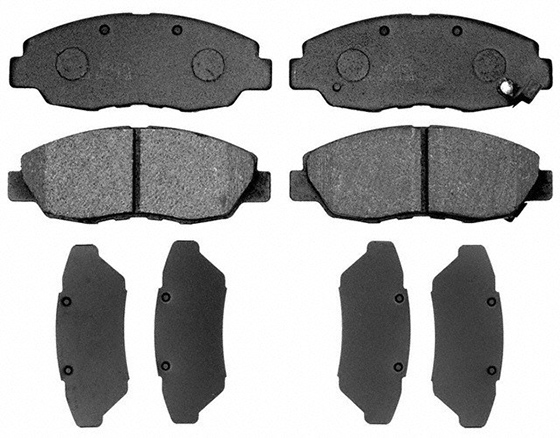Find genuine Honda parts at Mile High Honda in Denver, CO
Honda OEM Brake Pads in Denver
When it comes to vehicle upkeep, regular brake service is essential to ensuring the top quality safety and performance you’ve come to expect from your Honda.
Replacing your brake pads when it’s time is the easiest way to keep things working the way they should.
What Your Brake Pads Do
In vehicles with disc brakes, each wheel is attached to a brake rotor that spins with it. The brake caliper is a device that squeezes the spinning rotor when the brake is pressed, causing it to slow. This obviously creates a lot of friction, so the brake pads serve as a buffer between the caliper pistons and the rotors.
What Happens If Your Brake Pads Fail
- Damaged Rotors – Your brake pads protect your rotors. They also help distribute heat produced by friction. So if you wait too long to replace your brake pads, your brake pads will wear too thin and the heat won’t disperse correctly. This can damage your rotors and cause your whole braking system to overheat and ultimately fail.
- Damaged Brake Calipers – When your brake pads get worn down way too much, the metal clamps they are attached to (brake calipers) can grind against the rotors, causing them to warp or break. In fact, both the calipers and rotors can be destroyed in this scenario. This puts you in danger on the road, as your brakes can fail. Additionally, the repairs for this will be far more costly than simply replacing your brake pads in time.
For Honda drivers in the Denver area, Mile High Honda is the best place to get your new brake pads!
Our online parts request platform makes it easy to select and purchase the best factory certified parts made specifically for your vehicle.
If you need further assistance determining which brake pads will best enhance the performance of your car, truck, van, or SUV, our experts are here to help! Contact our team, or swing by our Parts Department and speak with a specialist in person.
Are you unsure whether or not it’s time to replace your brake pads?
As a general rule, brake pads need to be changed every 20,000 – 60,000 miles. This number will vary depending on the model of your Honda. Check your owner’s manual to see how often your brake pads should typically be replaced.
Keep in mind, the amount of heavy driving you do also have a direct impact on how often you need to replace your brake pads.
There are warning signs that you need new brake pads, even if you haven’t reached your recommended mileage point yet.
7 Signs You Need To Replace Your Brake Pads
- The Brake Pedal is Pulsating
- The Brakes Make a Clicking Noise
- The Brake Pads Appear Too Thin
- The Brakes Make a Screeching Sound
- The Brakes Make a Grinding Sound
- There are Deep Grooves in the Rotor
- The Car is Pulling to One Side or the Other
If you would like help with brake pad installation as well as parts selection, schedule an appointment with our Service Team at your convenience.
We look forward to your visit!

Order Honda Parts
(303) 847-0126
Our Honda Parts & Accessories Specialists can help you with all of your needs!
Honda OEM Brake Pads in Denver
When it comes to vehicle upkeep, regular brake service is essential to ensuring the top quality safety and performance you’ve come to expect from your Honda.
Replacing your brake pads when it’s time is the easiest way to keep things working the way they should.
What Your Brake Pads Do
In vehicles with disc brakes, each wheel is attached to a brake rotor that spins with it. The brake caliper is a device that squeezes the spinning rotor when the brake is pressed, causing it to slow. This obviously creates a lot of friction, so the brake pads serve as a buffer between the caliper pistons and the rotors.
What Happens If Your Brake Pads Fail
- Damaged Rotors – Your brake pads protect your rotors. They also help distribute heat produced by friction. So if you wait too long to replace your brake pads, your brake pads will wear too thin and the heat won’t disperse correctly. This can damage your rotors and cause your whole braking system to overheat and ultimately fail.
- Damaged Brake Calipers – When your brake pads get worn down way too much, the metal clamps they are attached to (brake calipers) can grind against the rotors, causing them to warp or break. In fact, both the calipers and rotors can be destroyed in this scenario. This puts you in danger on the road, as your brakes can fail. Additionally, the repairs for this will be far more costly than simply replacing your brake pads in time.
For Honda drivers in the Denver area, Mile High Honda is the best place to get your new brake pads!
Our online parts request platform makes it easy to select and purchase the best factory certified parts made specifically for your vehicle.
If you need further assistance determining which brake pads will best enhance the performance of your car, truck, van, or SUV, our experts are here to help! Contact our team, or swing by our Parts Department and speak with a specialist in person.
Are you unsure whether or not it’s time to replace your brake pads?
As a general rule, brake pads need to be changed every 20,000 – 60,000 miles. This number will vary depending on the model of your Honda. Check your owner’s manual to see how often your brake pads should typically be replaced.
Keep in mind, the amount of heavy driving you do also have a direct impact on how often you need to replace your brake pads.
There are warning signs that you need new brake pads, even if you haven’t reached your recommended mileage point yet.
7 Signs You Need To Replace Your Brake Pads
- The Brake Pedal is Pulsating
- The Brakes Make a Clicking Noise
- The Brake Pads Appear Too Thin
- The Brakes Make a Screeching Sound
- The Brakes Make a Grinding Sound
- There are Deep Grooves in the Rotor
- The Car is Pulling to One Side or the Other
If you would like help with installation as well as parts selection, schedule an appointment with our Service Team at your convenience.
We look forward to your visit!
Online Honda Parts Request Form

Mile High Honda’s Parts Center Serves Customers in the Denver, Aurora, Centennial, Littleton, and Greenwood Village, CO area!



